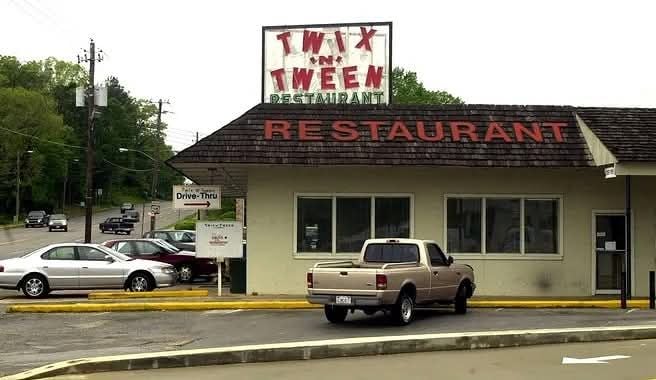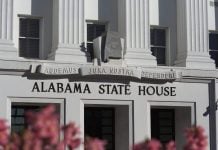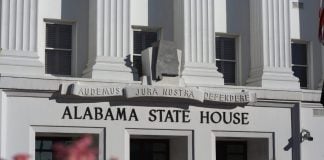The Economic Struggles of Rural Municipalities in Alabama
How The Rise & Fall of Twix-n-Tween and Internet Sales Taxes Tell the Story of Small Towns in Alabama
July 21, 2025
Reported by Mike Hobson
The Bibb Voice
According to the Alabama League of Municipalities, the state of Alabama contains 466 municipalities and of those, approximately 406 have populations under 12,000. The top 5 cities in Alabama are Huntsville (Pop. 225k), Birmingham (Pop. 196k), Montgomery (Pop. 195k), Mobile (Pop. 182k) and Tuscaloosa (Pop. 111k). There are only 66 Alabama cities with more than 10k population.
In 2019 the Cullman Tribune featured Bibb County in a Bi-Centennial publication about the history of the State. Just like any other traveler who passed through Bibb County during the second half of the Twentieth Century, many of them have a fond memory of Twix-N-Tween.
Ben Johnson wrote “ the famous Twix-N-Tween Restaurant which was a “must eat” friendly place on the Bibb County stretch of highway between Montgomery and Tuscaloosa. For more than 50 years, the Twix-N-Tween only closed on Christmas Days. The Twix-N-Tween ………started in Centreville in 1952….. “
Twix is now a fond relic of the past and the economic fortunes of Brent & Centreville, like other small towns in Alabama, closely parallels and follows the rise and decline of the Twix. The author of this article grew up amid this transformation and has witnessed the events of the last 80 years.
Back in the mid Twentieth Century almost all motorists, East-West, or North to South, passed through the intersection we still call Four Points, by way of U.S. Highways 82 & 25 or AL-5, regardless of their destination. And Twix-N-Tween was brilliantly located at the intersection. Twix thrived, and so did the fortunes of other small businesses in the two towns.
The business districts of Brent & Centreville thrived in those days. You could buy what you needed in the towns. Not only world famous BBQ from Twix, there were clothing stores like Nix & Co, Daily-James and Pierson Hardware, Western Auto, the 5&10, the Yellow Front, Meigs Rexall Drug, Ritz Theatre, Cleveland Grocery, Nix Pool Room, Elam Shoe Shop, Chism Cleaners, Peoples Bank and Henderson Furniture. There was Meigs Gulf with a Greyhound bus station, cafe and barber shop in the back. We even boasted a Pontiac store and International Harvester tractor dealership. You could visit your dentist or a physician in professional offices or reside in the Bank Building upper floors. All of these historic businesses thrived on the Court Square. The hustle & bustle of any Saturday was legendary.
Centreville also had Wood-Crews Chevrolet, Freeman Motor Parts, OK Rubber Welders, a taxi stand, an ice house, a cotton gin, train depot, Hobson Auto Parts, Wallace Grocery, Belcher Motor Company, Stacy Drug, Skataway Roller Rink & Putt-Putt Golf, and T.W. Stone Grocery with its own stockyard and cattle kill operation out back. Then there was the biggest enterprise of all, the W.E. Belcher Lumber Company with its own Commissary. Down at the Goldman Hayes barber shop you could not only get a hot towel strait razor shave and a haircut, you could still avail yourself of a hot shower.
There was the “rolling store” that delivered groceries from Centreville direct to rural homes across the county. Mr. Algie Langford sold tons of Standard Coffee all over Bibb County from the back of his panel van.
Brent bustled with Ward Mercantile, James Hardware, Bibb Supply, Meigs Drug Store, Brent Hotel, Brent Bank, Piggly Wiggly, Daily Faucette Motor Company, H&S Auto Parts, and an Allis-Chalmers tractor dealership, not to mention a cotton warehouse and a railroad depot. And, a thriving lumber mill we remember as the Olon Belcher Lumber Company. Don’t forget N.D. Cass where wooden toys were manufactured for years. A 1973 tornado destroyed much of that business district; it never really came back to Brent’s main street.
Brent & Centreville were both supported by several fine gas stations, restaurants, and automobile repair facilities. Automobiles were washed by hand in those days and usually blow dried with a 60 mph trip around the circuit.
Twix was born at the boom of the post World War II era. The national economy was exploding, hard working people were improving their family incomes, travelling increased exponentially accompanied by the baby boom, and the world was good.
What we called progress brought new roads. Bypasses were built around the towns to allow traffic to avoid the business districts. Big box stores emerged in the largest cities, attracting shoppers away from the small town merchants that depended on local sales. Local sales tax dollars melted away from the municipalities as tax revenues transformed with changing shopping trends. The nearby big city Mayors never complained as their brick & mortar store sales exploded, accepting the benefits and tax revenues of shoppers from outside their city limits.
Within 25 years of the birth of Twix the business landscape in Brent and Centreville was drastically changed, along with its tax base. Before the century ended almost every business mentioned above was shuttered and not to be seen again.
This story was not unlike other rural towns in Alabama. Interstate highways and feeder roads have changed traffic patterns & shopping habits. The manner we acquire the goods we need in daily life have all evolved and shifted with the economic headwinds. Like other small towns in Alabama municipalities have suffered trying to rebuild their sales tax base, balance budgets, struggling to fund and run government and provide citizen services.
The Rise of Internet Sales Tax
Fast Forward to 2015. We have conquered outer space and landed on the moon. An International Space Station circles the globe over our heads. The ubiquitous internet arrived and matured. Internet sales exploded, and changed the playing field again, for all Alabama municipalities. By 2015 online sales were a mainstay for the shopping world, and purchases made on the internet escaped all Alabama sales taxes. Sales tax growth was plummeting for the State.
Alabama state lawmakers reacted and passed the Simplified Sellers Use Tax Remittance Act (Act 2015-448) in 2015. The U.S. Supreme Court issued a ruling allowing states to force online shoppers to pay sales tax. The Alabama act allowed eligible sellers to sell their goods or services in Alabama from a location outside of the state with an easily-accessible method to collect tax on sales made. By 2025 the SSUT collections were humming along, distributing much needed sales tax revenues to counties, cities, and towns statewide
Due to the way the SSUT program is currently written through legislation, the 8 percent flat tax applies to all sales regardless of the locality the product or service was delivered to in Alabama. The tax is divided up with approximately 4 percent given to the state with the remaining approximate 4 percent distributed between local government. The state distributes its earnings with 1 percent for the Education Trust Fund and 3 percent for the General Fund. Counties receive about 1.6 percent of the SSUT earnings and municipalities receive 2.4 percent.
As of today the SSUT has disbursed $363, 569,474 in internet sales tax collections for this year alone.
The SSUT has been a lifesaver for the economies of small towns like Brent & Centreville. For example in calendar year 2024 Centreville received $236,249. in collected internet sales taxes, Brent received $250,762. and the Bibb County Commission received a total of $770,330 according to ADOR online reporting. Add in $102,684 for West Blocton & $124,199 for Woodstock you get a total of $1,484,224 allocated to Bibb County governments from SSUT collections.
The Latest Threat To Small Town Economies
Centreville Mayor Mike Oakley, a Board Member for the Alabama League of Municipalities recently disclosed a new looming threat to the fiscal health of small towns in Alabama, including Brent-Centrevile-West Blocton-Woodstock & the Bibb County Commission.
Today, some of the larger cities in Alabama are unhappy and grumbling about the distribution formula for the SSUT online taxes. Unsurprisingly, they are grasping for a bigger slice of the pie, according to Mayor Oakley. “If they are successful, it will be at the expense of small towns like ours in Bibb County,” according to Oakley.
The storm is brewing in none other than our neighboring town of Tuscaloosa. On Monday, April 7, Tuscaloosa Mayor Walt Maddox hosted a summit on the SSUT issue and invited more than 50 mayors from across the state to discuss the issue. During the summit, Maddox and fellow mayors, discussed the issues with the current SSUT system, outlining how it was affecting several large municipalities.
As part of the summit, Maddox presented Destination Sourcing as a possible solution to the issue which would change online sales to be based on the location of where the buyer takes possession of the item sold. Destination Sourcing would fix the fiscal losses that certain major municipalities are experiencing through the SSUT system, however, any smaller municipalities that were benefitting from the population distribution could see a decrease in funding, according to Maddox.
Tuscaloosa Mayor Maddox is trying to start a grassroots movement and seeks to force the state to revisit how their SSUT distribution is structured. Several other larger cities have indicated they are willing to join Tuscaloosa in a lawsuit against the State of Alabama. It is all designed to garner a larger sales tax benefit for towns like Tuscaloosa, said Mayor Oakley.
“It’s the distribution of the SSUT sales tax that has put counties and cities at odds since its inception. When a consumer buys an item at a brick-and-mortar store within city limits, the city keeps a majority of the tax revenue. When that item is bought online, counties and cities statewide takes a slice of the revenue”, according to Mobile Mayor Sandy Stimpson.
“If you’re in a smaller city, you’re getting some of Mobile’s tax money,” Mobile Mayor Sandy Stimpson said. “There are a lot of people that are perfectly happy because they’re taking other people’s money.”
“When the SSUT was passed into law, 7.5% of sales nationwide were made online, according to Stimpson. In 2024, that amount rose to 16%. With that rise in online sales, Stimpson said the SSUT becomes more costly each year.”
Mayor Maddox makes the same arguments, claiming that Tuscaloosa is entitled to all of the tax revenues derived from online sales. Maddox said Tuscaloosa could use that lost revenue for infrastructure, economic development and public safety.
How much did Tuscaloosa and the other large cities collect from internet sales from out of state vendors prior to the enactment of SSUT ? The answer is a resounding zero. Same for everybody else in Alabama. Now only a few of the largest cities are complaining about how the collected SSUT funds are distributed.
Sonny Brasfield, Executive Director of the Association of County Commissions of Alabama, said county governments use the additional money they get from the SSUT for many of the same sectors.
“I don’t really understand the point that he’s trying to make, just to be honest,” Brasfield said. “I don’t think there’s an argument to be made to treat bigger cities differently than you treat the rest of local government.”
Brasfield said much of the money funneled to the counties is used for court operations, law enforcement, economic development and infrastructure needs.
Mayor Oakley of Centreville says that “the big town Mayors are clouding or masking the real issue and making arguments that don’t wash. Their problem is the same story that every rural town has already experienced and suffered through. Consumers, regardless of where they live, are now buying more through online vendors, not local stores, whether rural or big town brick and mortar. “
As online sales increase it was to the detriment of the local tax base, and the SSUT is the only tool that has provided a remedy that helps all towns in Alabama. After all, the basis for the SSUT is an 8% sales tax that applies to sellers that do not have a residence in the state, said Oakley.
“Big town Mayors seem to overlook or minimize that their own citizens are often buying from online, out of town vendors, not always local, and they are suffering the same pain small towns have felt for decades, before SSUT arrived. But they seem to think the tax revenue should be all theirs, says Oakley. Our legislature came up with a formula that helps every small city and town in the State in the face of the internet sales revolution. I don’t think we are going to see them reverse course to please the big cities.
“The Destination Sourcing concept is a smoke and mirrors plan designed to invade the legislative solution for fair tax distribution already in place and would take revenues that are being used to provide citizen services in smaller municipalities. Twix-N-Tween is not coming back” said Oakley.
REFERENCES:
https://www.cullmantribune.com/2019/03/10/67-county-alabama-garden-party-bibb-county/
https://www.wbrc.com/2025/07/15/growing-concerns-over-internet-sales-tax-shortfalls-alabama/

















Mike, this was an interesting tax analysis that I’ve not heard before; thanks for the reporting and the opinion. Lots to think about. And also, I miss the Twix-N-Tween; before I moved to Bibb County, this was one of my main connections here, our family planning to stop in on our way to the coast each summer.